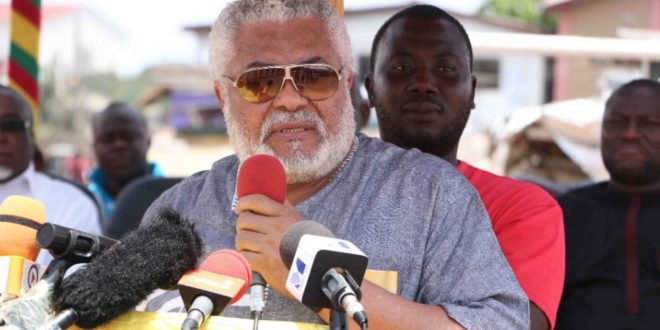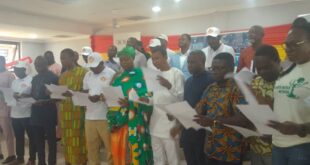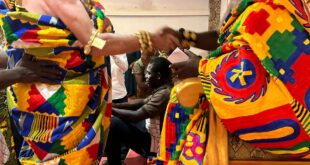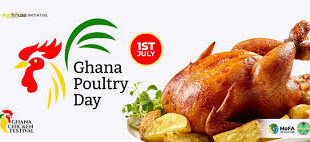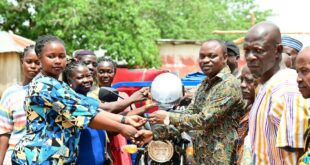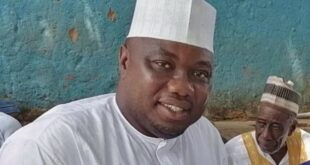Former President Jerry John Rawlings has respondented to the now popular book published by Prof Kwamena Ahwoi titled ‘Working with Rawlings.
The book stirred controversy for the bad-timing of its release (months to the December elections) and what some claim to be half-truths.
Read the full response from the former President below
The Integrity of truth – Statement from the office of President Rawlings
The Office of Former President Jerry John Rawlings, has noted with concern contents of a book titled ‘Working with Rawlings’, authored by a former appointee of the PNDC and NDC who now calls himself Professor Kwamena Ahwoi.
The book attempts to chronicle the history of the role Kwamena Ahwoi played as an appointee of the former President, but disappointingly employs fabrications and grapevine accounts to paint a denigrating picture of President Rawlings and his colleagues.
Everyone is entitled to his or her opinion. President Rawlings has over the past four decades tolerated various views, recognizing the fact that as a public figure one will not be immune to such, even when said opinions are vicious and derogatory.
However, the public deserve to be served the truth as far as some of the contents of the book are concerned.
The book is generously economical with the truth given that President Rawlings supported President Mills consistently from the year 2000, much to the chagrin of many of those who morphed into his post-victory supporters in 2006.
MILLS’ PRIVATE CALL TO RAWLINGS
After his landslide victory in the 2006 NDC Primaries, candidate Mills travelled to South Africa for medical treatment. While in South Africa, Mills put a call through to President Rawlings and indicated his desire to forego the candidature for the presidential election owing to his medical state. Following this conversation, President Rawlings held a meeting with some leading members of the Party to express concern about the state of candidate Mills’ health, and urged them to identify recognizable party members who could step in. President Rawlings is on record as having suggested that some known personalities in the party should position themselves to demonstrate that the NDC had enough Presidential material.
Bizarrely, Kwamena Ahwoi has written a lengthy diatribe about how Rawlings coerced his brother (Ato Ahwoi) to contest Mills ahead of the primaries, leading to the breakdown of their healthy relationship. It should be stated on record, that President Rawlings took the responsible and pragmatic approach after he received that politically unnerving call from Professor Mills. He consulted the Party leadership to take strategic steps to fill the gap which by Professor Mills’ account was imminent.
Urging some members of the Party to position themselves for a potential contest, was in no way an attempt to undermine, sabotage, betray or malign Professor Mills as the author shamelessly infers in his book. More disappointing is the impression created that he was and is unaware of that critical phone call from Professor Mills (while in South Africa) to President Rawlings. It is rather telling of him to deny this well-known crisis merely in his bid to deride and denigrate the genuine efforts of former President Rawlings to arrest a crisis.
When Professor Mills returned to Ghana, meetings were held with him without the knowledge or participation of President Rawlings, where Professor Mills was convinced by those present, not to withdraw his candidature and actually made to believe that President Rawlings was working to undermine him. That, was when the mistrust begun, and Mr. Kwamena Ahwoi was and is well-known to be one of the master-architects of that manipulative agenda that pushed a very unwell candidate Mills into the 2008 General Elections.
It must be noted, that at no point did President Rawlings support Professor Mills in his bid for presidency, with the aim or intention to manipulate Professor Mills should he become President, despite the attempts of various individuals to peddle falsehoods and sow disunity.
Having worked with Professor Mills on various policy and manifesto achievements during his presidency, the aim was to support him and the NDC party back into government, for the good work of the pre-2000 NDC Administration to continue. After nineteen (19) years of working alongside various individuals with different motives and political beliefs including his political opponents, President Rawlings had acquired enough experience in people management to not be as unsophisticated in his relationship with Professor Mills as the book seeks to misinform.
President Rawlings was critical of President Mills’ administration, there is no denying that, in usual manner, this was done openly and with the best of intentions. He had meetings with President Mills offering counsel and suggestions strictly to the good of Mills’ presidency and that of his government. Rawlings has always remained consistent in his open and bona fides criticisms of President Mills’ administration which, to date, are still outstanding matters. These include:
The failure of the Mills Government to investigate the assassination of the Yaa-Naa and forty (40) of his elders; President Mills’ inability to look into the death of Alhaji Issa Mobilla, the late Northern Regional Chairman of the CPP; The failure of the Mills Government to investigate and prosecute genuine fraudulent activities within President Kufuor’s administration; and The lack of dedication to the Party ideals of probity and accountability, as well as the monetization of the NDC internal electoral processes. THE 2008 NDC CAMPAIGN
In his bid to justify his version of events, the author goes as far as stating that President Rawlings was visibly absent from the 2008 national election campaign. Without needing to belabour a well-known and publicized fact, this account is absolutely false! President Rawlings and Nana Konadu Agyeman-Rawlings travelled extensively to campaign for candidate Mills and these campaigns were covered by the media and are a matter of public record. The documentary titled – An African Election – filmed during the 2008 campaign and election visibly shows the former president on the campaign trail with steely and unparalleled determination.
President Rawlings and Nana Konadu Agyeman-Rawlings were actually an integral part of the NDC campaign structure for the 2008 election. He started his campaign in Sankore in the Brong Ahafo Region, and subsequently visited all ten regions, visiting some towns and villages twice, sometimes walking long distances in the process. President Rawlings traversed the whole country and made headlines by being the first to reach Tain, in the Brong Ahafo Region when that town became the eye of the storm during the election, leading to the legendary “third round”. Nana Konadu Agyeman-Rawlings campaigned in not less than 15 major markets in Greater Accra Region, after which she moved straight to the Volta Region to start work. She also campaigned in the Ashanti, Brong Ahafo and Western Regions. She is also on record as having loaned vehicles and countless other resources to the Party towards the elections.
Lest we forget Admiral Owusu Ansah, a courageous and patriotic member of the NDC who in spite of his failing health, joined the campaign trail shunning the comforts of his home in Accra in order to have Mills elected. This is a tribute to Admiral Owusu Ansah and patriots like General Nunoo-Mensah, who have selflessly sacrificed their lives, livelihoods and comforts for the Party; to then have one callously divisive individual, who in an attempt to increase book sales, insults and attempts to nullify the role and importance of these individuals.
Admiral Owusu Ansah, the true and dedicated members of the NDC owe you a debt.
Unsurprisingly, the author is ‘unaware’ of the campaign presence of the former President during the 2008 elections. Neither Kwamena Ahwoi, his brother nor majority of their cronies was on the campaign trail, preferring to stay in the comforts of their homes in Accra, perpetually leaving the hard work of getting the party re-elected to others, but always being first in line for political appointments.
ATTA KWABENA KUMAH
The entire reference to ‘Atta the mortuary man’ by the author is obviously ill-intentioned, unresearched and yet another attempt to dramatize the well-orchestrated divide in his Rawlings versus Atta Mills tale.
Atta Kwabena Kumah popularly known as ‘Attah the mortuary man’ was a good friend of President Rawlings, who worked at the 37 Military Hospital, Anatomical Pathological Unit for over forty (40) years. He sadly passed away in July of 2011 at the age of 82. They had known each other for close to forty (40) years, during which time Attah Kumah would regale President Rawlings with his life stories and Rawlings would do same.
At the introduction of his address at the 2010 NDC Congress in Tamale, President Rawlings cracked a joke (as he is known to do) recounting one of his many interactions with Atta Kumah which got the entire audience laughing and relaxed in anticipation of the more serious task ahead, the election of National Executives of the Party. This particular non-incident has been clarified on so many occasions that one only has to take the time to find sources for clarification.
It is rather unfortunate, that even a light-hearted joke that had the intended effect of diffusing the tensions usually experienced at party congresses, has been twisted into yet another Mills versus Rawlings affair ten (10) years later. Clearly, we can all see who seeks the perpetual disunity and failure of the NDC; once operating from the shadows and now clearly in the light.
RAWLINGS: HIS VISION AND LEGACY
President Rawlings has always stated publicly and unapologetically that throughout his tenure, he served his nation with a team comprised of various experts with different political affiliations each of whom patriotically contributed their talent and intellect to the cause.
As a young Air Force officer (in his twenties) who used to fly across the country, former President Rawlings came face-to-face with some stark realities across the country. He and his pilot colleagues, would sometimes go to local markets in places like Yendi to purchase some local produce. He noticed old men selling beans, sorghum etc. and placed close to their legs were containers with a brown looking fluid. He was shocked to the core when on enquiry, he would be informed that the dirty looking fluid was their drinking water. He felt pained knowing that folks in the urban areas were so privileged that they were able to flush their toilets with clean water from the taps while those in the rural areas drank Guinea-worm infested water. Accept it or not, this was our reality as a nation. How could these experiences not have sparked a vision or a philosophical outlook in this young pilot’s head?
Even more disturbing was the fact that large patches of Ghana were without lights when he flew at night. His perspective began to take a more serious tone as he recognized the reality on the ground and the fact that without electricity and water, the populace would be living an unhappy and distressing sub-standard existence, while urban dwellers remained out of touch with the reality on the other side of the country. Years later, President Rawlings’ priority naturally, was the provision of potable water for the wider populace and the distribution of electricity to the entire country. A vision he can proudly state he largely saw to fruition.
The next step in his vision for development was the construction and equipping of regional hospitals across the entire country. Indeed, in the early days (1980s) there was a time when Dr. Joe Abbey informed Flt. Lt. Rawlings that drugs for Government-run hospitals could not last for a week. A most shocking situation! At the time, historical records will clearly show that support from Eastern bloc countries who could be considered natural allies was not forthcoming owing to their own internal challenges. With the urgent need to complement much-needed social development projects, the PNDC Government had no option but to go West to the International Monetary Fund (IMF) and the World Bank, where we as a Government and a nation made history by defining our financial needs, terms and method of implementation to those institutions; leading to a complete overhaul in the way the IMF and World Bank approached project funding and implementation globally.
President Rawlings has always seen his vision and legacy as a collective one that he hopes each of the dedicated patriots also recognizes as their own legacies as well. It is said, that it is an effective leader that consults with and participates in the backbreaking work of development, but most importantly trusts in the craft, talent and skills of his team to deliver on his and their collective vision. President Rawlings no doubt had a grand vision for Ghana, and in tribute to the dedicated patriots who worked with him to realise this vision, as far as practicable, a few of these achievements are set-out hereunder:
Institution of a local government structure, a clear empowering process that has successively been embraced by all Ghanaians irrespective of political affiliation; And credit must go to patriots such Dr. Ayirebi Acquah and Madam Joyce Aryee and several others who played a significant role in implementing the policy. The Rural Electrification Project that ensured that most parts of Ghana were provided with electricity, recognizing the benefits that provision will add to socio-economic development; Prior to the era of Rawlings, travelling from Southern Ghana to Northern Ghana took days. After major roads were constructed to link most parts of the Northern Regions to the South half of Ghana, we became one unified country not just in name but also accessibility. Championing of women’s development and affirmative action. The results are there for all to see. Nana Konadu Agyeman-Rawlings and the 31st December Women’s movement, were instrumental in agricultural the country’s agricultural development, trade and the development of many of Ghana’s health facilities. With food security a priority for Rawlings, agricultural policies were initiated that resulted in the recognition of Ghana’s food production growth of 148 percent for the period 1995-1997 as “the third highest achievement in the record after Jordan (157%) and China (156%)” in the World Bank’s 1999-2000 Development Report. The introduction of sustainable economic policies that led to: – Increased productivity in export produce like cocoa and gold;
– The establishment of the National Development Planning
Commission;
– The revival of the Ghana Export Promotion Council, all institutions which have survived to date.
There were massive developments in the health sector including: –
The establishment of the Cardiothoracic Centre at the Korle Bu Teaching Hospital
– The establishment of the Korle Bu Radiotherapy Centre
– The wooing of eminent personalities such as Professor Frimpong Boateng to return to Ghana to serve their country.
– The Reconstructive Plastic Surgery and Burns Centre was also constructed under President Rawlings’ watch.
RAWLINGS – FOUNDER OF THE 4TH REPUBLIC
President Rawlings, in 1992, established the 4th Republic of Ghana, the longest running in the history of this nation, which still endures. Following his constitutionally mandated two terms serving as the President of Ghana, he handed over the flagbearership of the NDC to Professor Mills and the leadership of the nation to President Kufuor in 2001.
Prior to the return to constitutional rule in 1992, Rawlings initiated and supervised a process of transition to constitutional rule as early as 1986 through the actualisation of the District Assembly concept as a primary grassroots democratic organ. Subsequently, the National Commission on Democracy sought opinions from Ghanaians on the best form of democratic governance to adopt. Eventually the former President was presented with a report that recommended an expansion of the District Assembly system into the Regional and National Assemblies where individuals would nominate themselves for elections.
President Rawlings has never shied away from stating that he is not a supporter of multiparty democracy because it tends to allow a minority to manipulate and rule the majority and brings about division. In spite of his strong reservations, he still accepted the integrity of the information from his team, to adopt the multiparty system of democratic governance and actually stood as a presidential candidate in both the 1992 and 1996 General Elections. Due to his faith in his team, and desire to prioritize the national development agenda, he chose not to exercise his veto as Head of State, despite his reservations about the multi-party system.
Former President Rawlings set an admirable record on the continent by willingly and smoothly handing over power in 2001 when his party lost the 2000 General Election. The continent is currently strewn with leaders who have entrenched their stay after their constitutionally obligated terms, amending the constitution, rigging elections or simply refusing to step down. Today the precedent established by President Rawlings has ensured that the 4th Republic has enjoyed four smooth political transitions.
NANA KONADU AND THE NDC – SACRIFICE AND BETRAYAL
The role, hard work, strategy and organisational talent that Nana Konadu applied to build and propel the NDC to countless victories can never be eroded. The various attempts to not just discount the central role she played, but to also deride her, is symptomatic of the myopic selfishness of characters within the NDC who cannot appreciate the fact that in so doing to pioneers of the Party like herself and others, you have no history to speak of.
To peddle falsehoods in the name of hearsay as a justification for the blatant lies in the book is unbecoming of an academician; albeit with the sole intention of creating the impression that Nana Konadu had a role to play in the so-called Rawlings versus Mills tale.
Nana Konadu played an integral role in the development of both the PNDC and the NDC, and the attempts by the author to denigrate her and nullify the key strategic and organisational role she played is yet another disappointment of the book.
When the ‘Swedru Declaration’ was made (prior to the 2000 elections), Nana Konadu Agyeman-Rawlings had in fact been out of Ghana for several months working on a women’s health project for the World Health Organisation (WHO). A fact the author could quite easily have verified were he or any of his proof-readers inclined to do so. She was informed about the Declaration while she was abroad. Surely, logic would indicate, that had she any intention to contest that election, she would have been in the country campaigning, or at the very least have set in motion her campaign machinery with which to achieve her Presidential objectives. At no point did she indicate to President Rawlings or members of the Party, that she had any intention or inclination to be the flagbearer of the Party. On her return to the country, she rapidly rolled out her campaign strategy and machinery in support of Professor Mills. Yet another fact that can be easily and publicly verified.
April 2000 Congress
In writing on the Extraordinary Congress of April 2000, the author again alleges that Nana Konadu Agyeman-Rawlings was unhappy with the proliferation of “Mills for President” T-shirts and confronted several people who wore the T-shirts including he (Kwamena) and Kofi Totobi-Quakyi. It defies logic for an academician turned author to include this falsehood in his work when President and Mrs. Rawlings had publicly thrown their weight behind Vice-President Mills for the Presidency and indeed after the Congress, they campaigned extensively and comprehensively for the candidate.
Further, to insinuate that Mrs. Rawlings was averse to the wearing of “Mills for President” T-shirts is absurd given that Nana Konadu Agyeman-Rawlings and her women’s group were actually responsible for printing thousands of “Mills for President” paraphernalia to her personal debt.
The foregoing is merely a crystallisation of decades of a smear campaign led by Ahwoi to shift the blame for all the many failures of the Party onto Nana Konadu Agyeman-Rawlings. This is indicative of the consistent lack of reflection and the refusal to take responsibility for mistakes, that have led the Party to the point at which it finds itself.
Professor Kwamena Ahwoi Afiadenyigba, Ada Incident
In 2000, Vice President Mills had been confirmed as the candidate for the NDC. Nana Konadu, as part of her political campaign for the Party, created a programme for the Greater Accra Region. One of the events was the opening of a school in Afiadenyigba, Ada which she invited Mrs Mills to commission, to officially outdoor her to the Dangbe community. Although protocol arranged for the First Lady and Vice-President’s wife to travel together, Mrs Mills decided to take the lead on the journey.
One of the etiquettes that J.J. Rawlings insisted upon at public events, which then became custom, was not to drive into durbar grounds, thereby whipping up dust onto the chiefs, royalty and the community. It therefore became an unspoken rule since the 1980s that government officials arriving at any function were to alight from their vehicles at the periphery of the durbar grounds and walk onto the grounds.
When Mrs. Mills arrived at the durbar grounds at Afiadenyegba, her convoy in an attempt to drive onto the sandy durbar grounds was frantically flagged down and stopped by a police officer assigned to the function. Mrs. Mills in a fury demanded the reason for this. The police officer proceeded to explain the rationale for stopping her car which unfortunately did little to diffuse the situation and she said she was leaving. The 31st DWM ladies that organised the event frantically went on their knees to apologise to the Vice-President’s wife and begged her to stay. This was in full view of the chiefs and people gathered.
Nana Konadu eventually arrived at Afiadenyegba to the sight of some elderly organisers on their knees, pleading, with Mrs. Mills who was clearly upset. Nana Konadu enquired as to what had transpired and was briefed by her organisers. In an attempt to de-escalate the situation, Nana Konadu apologised to Mrs Mills on their behalves and explained that all manner of hiccups occurred at public events but that should not bother her. When Nana Konadu proceeded to greet the chiefs and people present, she was met by shocked chiefs, queen-mothers and their subjects, all of whom could have been located to corroborate the incident, was the author so inclined.
In the days that followed, it came to light that the police officer in question and his colleagues present were transferred outside of Greater Accra Region. One of the officers wrote a report to the then IGP Peter Nanfuri who also reported the entire matter to President Rawlings. Shocked and upset at the entire incident, President Rawlings asked Vice-President Mills why he would issue such instructions against the officers when they were just doing their jobs. The transfers were subsequently overturned.
Nana Konadu was still on her regional campaigns for the NDC and Vice President Mills, unaware of the demotions, transfers and subsequent discussions taking place in Accra. Whilst in Cape Coast, the then Regional Minister Jehu-Appiah and two other persons met with her to enquire as to her knowledge of the incident. She narrated it and they expressed surprise at such a trivial incident taking this turn.
Kwamena Ahwoi, John Kwadjo and E.T Mensah, all appointees at the time, authored a report of this incident which lays all the facts bare. This is a matter of public record and were the author so inclined, he would have consulted it as he did with other documents in his possession.
2011 Primaries
Prior to her decision to contest President Mills in the 2011 NDC Primaries, Nana Konadu Agyeman-Rawlings was the Vice-Chairman of the NDC, and she achieved that position by sheer merit, winning by a large majority at the 2010 Congress in Tamale. As with any other member of the Party or in the wider sphere, as a citizen of this country, she has a democratic right to contest an election employing hard work, a proven track record and sheer wit to her success. By doing so at the 2010 NDC Congress, she put herself in the spotlight, to be scrutinised and judged by the delegates who made their own decisions.
This is in clear juxtaposition to others who never put any work into the success or survival of the NDC Party, have manipulated events and people, to sow seeds of mistrust and disunity whilst promoting their own family agenda.
For the record the 2011 NDC primaries campaign of Nana Konadu Agyeman-Rawlings, was led by personalities such as Hon. Michael Teye Nyaunu and Hon. Namburr Berrick.
PERSONAL OPINIONS
Varied personal opinions have been sought by the author in his bid to sully the image of President Rawlings and Nana Konadu Agyeman-Rawlings. A tall list of personalities take turns to offer their apparent view of the Rawlings-Mills relationship.
It must be stated, that the claim by named persons in the book that Nana Konadu, at a meeting with Professor Mills requested for the Vice-Presidential slot is an outright fabrication. Nana Konadu never requested, indicated or discussed with any individual an intention or desire to be the running-mate to Vice-President Mills.
This book is quite unfortunately, riddled with countless fabrications and assumptions ascribed to said individuals who were thought to have more honour.
President Rawlings and President Mills had a good relationship during the latter’s tenure. They interacted several times via telephone and met a few times either at the Ridge residence or the Castle, Osu and at all times they treated each other with utmost respect. These meetings were at the behest of President Mills, so it is difficult to reconcile the so-called bitterness that Ahwoi portrays in his book to the reality of the relationship between Rawlings and Mills.
A number of personalities that the author refers to and others, have written publicly to disassociate themselves from the comments in the book. A clear indication of the credibility or lack thereof of its contents.
This book appears to have no aim of serving history with facts. It reads as an opportunistic and calculated attempt to ridicule President Rawlings and former First Lady Nana Konadu Agyeman-Rawlings, using the personality of the late President John Atta Mills as the bait. From the inception, the author has harboured his own parochial agenda which clashed naturally with the integrity and accountability of Rawlings. Those of such ilk will continue to attempt to rewrite history to suit their selfish ends, but discerning minds will no longer be reticent of nor willing to tolerate such political trickery and subterfuge.
The truth is a debt owed to the memory of the departed as well as current and future generations. The true legacy of the PNDC into the NDC under President Jerry John Rawlings, is one that ought to be acknowledged if there exists a Fourth Republic that has endured.
Signed:
Kobina Andoh Amoakwa
(Communications Directorate)
Source: www.ghanaweb.com
 Home Of Ghana News Ghana News, Entertainment And More
Home Of Ghana News Ghana News, Entertainment And More
